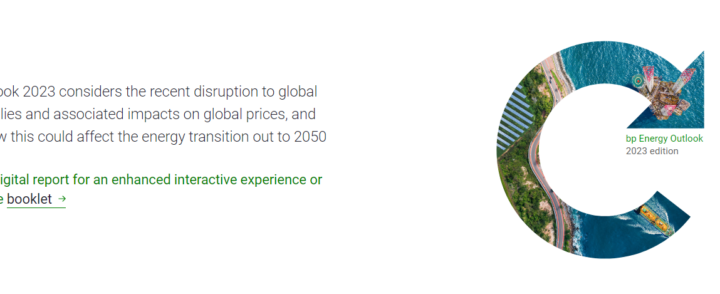BP Report | Energy Outlook
Energy Outlook 2023 considers the recent disruption to global energy supplies and associated impacts on global prices, and explores how this could affect the energy transition out to 2050.
Core beliefs of Energy Outlook 2023
This year’s Outlook can be used to identify aspects of the energy transition that are common across the main scenarios. These trends help shape core beliefs about how the energy system may evolve over the next 30 years.
- The carbon budget is running out. Despite the marked increase in government ambitions, CO2 emissions have increased every year since the Paris COP in 2015 (bar 2020). The longer the delay in taking decisive action to reduce emissions on a sustained basis, the greater are the likely resulting economic and social costs.
- Government support for the energy transition has increased in a number of countries, including the passing of the Inflation Reduction Act in the US. But the scale of the decarbonization challenge suggests greater support is required globally, including policies to facilitate quicker permitting and approval of low-carbon energy and infrastructure.
- The disruption to global energy supplies and associated energy shortages caused by the Russia-Ukraine war increases the importance attached to addressing all three elements of the energy trilemma: security, affordability, and sustainability.
- The war has long-lasting effects on the global energy system. The heightened focus on energy security increases demand for domestically produced renewables and other non-fossil fuels, helping to accelerate the energy transition.
- The structure of energy demand changes, with the importance of fossil fuels declining, replaced by a growing share of renewable energy and by increasing electrification. The transition to a low-carbon world requires a range of other energy sources and technologies, including low-carbon hydrogen, modern bioenergy, and carbon capture, use and storage.
- Oil demand declines over the outlook, driven by falling use in road transport as the efficiency of the vehicle fleet improves and the electrification of road vehicles accelerates. Even so, oil continues to play a major role in the global energy system for the next 15-20 years.
- The prospects for natural gas depend on the speed of the energy transition, with increasing demand in emerging economies as they grow and industrialize offset by the transition to lower carbon energy sources, led by the developed world.
Source: BP



